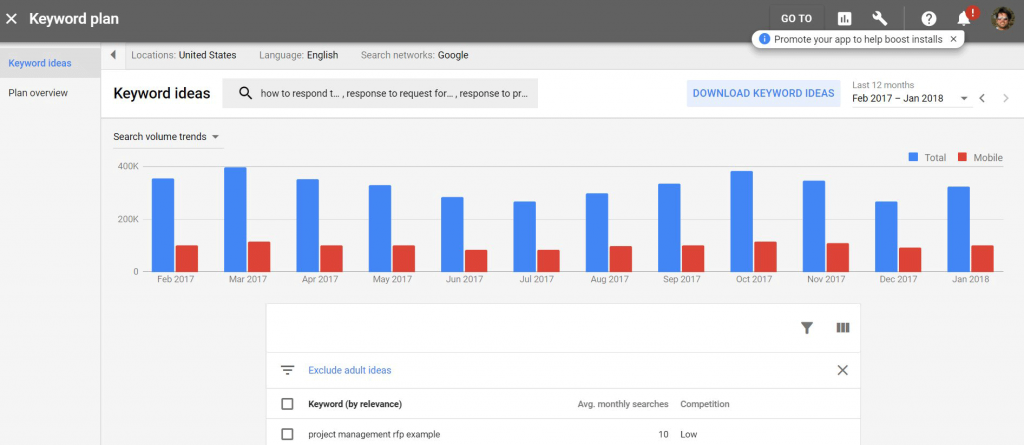1.Keyword Planner :
When it comes to keyword search tools, Google Keyword Planner is the best place to start. It is designed for advertising, but by customizing your results for one of your competitors, you can use it to research organic keywords. Enter your product or service, the landing page and product category of your competitor. Customize your search for keywords of certain types.It is best Keyword tool.
With Keyword Planner, you can: search for new keywords and ad group ideas Get search volume for a list of keywords or group them into ad groups Get traffic forecasts for a list of keywords Multiply keyword lists to get new keyword plans You should pay attention to keyword ideas and ad group ideas, as both can help with SEO.
1.To determine relevant keywords to target, pay attention to average monthly searches, competition, and other available metrics.
2.If you plan to do SEO and PPC together, Keyword Planner can help you determine which keywords are best for organic or advertising purposes.
You can also use the suggestions of Keyword Planner as a basis for building long tail keywords using some of the other tools.

2. KWFinder :
KWFinder is a large interface long tail keyword tool. It shows you trend, volume of search, CPC, and level of results difficulty. It works as a keyword finder as you would expect, but if you click on a single keyword, a second pane will appear showing its level of difficulty (from one to one hundred) and the current Google search results:
This allows you to analyze keywords and show you which domains target some keywords, backlinks to the page, social shares, and traffic. These additional keyword dimensions may be relevant, particularly when integrating SEO with content marketing.
Also, KWFinder helps you dig into local keyword research–you can target your city, state or country search results.

3.Keyword Everywhere :
Keyword Tool may be a nice place to begin for keyword data processing. The tool uses Google Autocomplete knowledge to form its information of long-tail keyword suggestions.
Anyone mistreatment Google’s Keyword Planner for keyword analysis ought to additionally use Keyword Tool. Since Keyword Planner is meant for advertisers, it won’t forever show profitable long-tail keywords that Keyword Tool manages to capture.
This tool is free for the primary 750+ keyword suggestions; check in for the professional version to research keywords more and see knowledge like search volume, CPC on AdWords, and competition. It additionally permits you to export your results to CSV.
Another cool feature of Keyword Tool is that it additionally helps you discover long tail keywords for YouTube, Bing, Amazon, and therefore the App Store.

Also check: Link Building strategies
4.Moz :
Keyword Explorer is a new Moz tool that adds to keyword research some extra dimensions. Keyword Explorer offers, in addition to Volume and Difficulty:
Keyword Planner, Google Suggest, and Related Searches are used for the tool. If you have already developed a list of keywords with a different tool, you can easily upload them to Keyword Explorer for more insight and prioritization.
Also, the Keyword Planner provides a deeper understanding of why some pages also rank in SERPs based on link and social data. This can help you with your SEO planning .

5.Google Trends :
Let’s get things started with another useful Google keyword tool: Google Trends. Google Trends shows how search trends are changing over time. Enter a keyword and you’ll see that search query’s relative popularity over the past 12 months.
To show how useful this can be, let’s check for “protein powder” in the Google Trends data.
